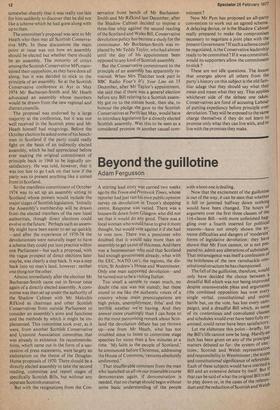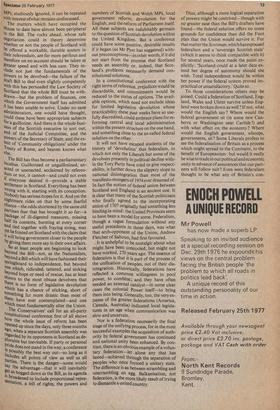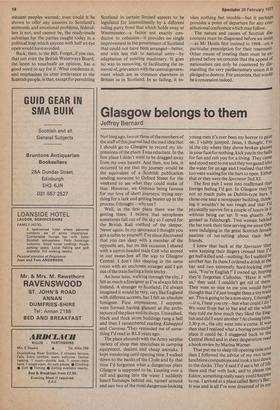Beyond the guillotine
Adam Fergusson
A stirring lead story was carried two weeks ago by the Troon and Prestwick Times, whose reporter had just run his own public opinion survey on devolution in Troon's shopping centre. Response was varied. There was a housewife down from Glasgow who did not see that it would do any good. There was a local woman who would have to give it more thought, but would vote against it if she had to vote now. There was a pensioner who doubted that it would take more than an assembly to get us out of this mess. And there was a businessman who said that Scotland had enough government already, what with the EEC, NATO (sic), the regions, the districts, St Andrew's House and Westminster. Only one man supported devolution—and he turned out to be a visiting Italian.
Too small a sample to mean much, no doubt (the size was not stated); but these sound to me like the authentic voices of a country whose main preoccupations are high prices, unemployment, fitba' and the terrible weather we're having. And they answer more crushingly than I can hope to do the most patronising remark about Scotland the devolution debate has yet thrown up--one from Mr Heath, who has not troubled since to listen to committee stage speeches for more than a few minutes at a time. 'My faith in the people of Scotland,' he announced before Christmas, addressing the House of Commons, 'remains absolutely undimmed.'
That insufferable comment from the man who launched us all on our miserable course demonstrates again, if demonstration is needed, that no change should begin without some basic understanding of the people with whom one is dealing.
Now that the excitement of the guillotine is out of the way, it can be seen that whether it fell or jammed halfway down nothing would have been changed. The hours of argument over the first three clauses of the 116-clause Bill—with more unfinished haggling over a fourth inserted for political reasons—have not simply shown the eX-, treme difficulties and dangers of 'moderate forms of legislative devolution: they have shown that Mr Foot cannot, or is not prepared to, admit any alterations of substance. Thatintransigence was itself a confession of the brittleness of the new ramshackle constitutional structure he has championed, The fall of the guillotine, therefore, vvoolcl only have decided the choice between 3 dreadful Bill which was not being improved despite unanswerable pleas and arguments (the combined opposition has won every single verbal, constitutional and moral battle but, on the vote, has lost every cam" paign), and a dreadful Bill which, as none of its contentious and convoluted clauses and schedules would ever have been fully ex' amined, could never have been satisfactory. Let me elaborate this point—briefly, for the Bill's life cannot now be long. Hardly an inch has been given on any of the princiPol matters debated so far: the system of elections; Scottish and Welsh representation and responsibility in Westminster ; the scone and constitutional significance of referenda. Each of these subjects would have merited a Bill and an extensive debate by itself. But that can be said of what the original Bill tried to play down or, in the cases of the referendum and the reduction of Scottish and Welsh
MPs, studiously ignored, it can be repeated With interest ofwhat remains undiscussed.
The matters which have occupied the House to date have almost been peripheral to the Bill. The rocks ahead, whose safe negotiation could in theory determine Whether or not the people of Scotland will he offered a workable, durable system in their referendum, are far more perilous and therefore on no account should be taken at greater speed and with less care. They include not just the fundamentals of the Powers to be devolved—the failure of the draft Bill to deal even slightly competently With this has persuaded the Law Society of Scotland that the whole Bill must be withdrawn—but the problem of finances, one Which the Government itself has admitted it has been unable to solve. Under no sane administration, one would have thought, could these have been appropriate subjects for a guillotine. And there is the whole business of the Scottish executive to sort out,
and of the Judicial Committee, and the Powers of the Secretary of State, and the extent of 'Community obligations' under the Treaty of Rome, and heaven knows what else.
The Bill has thus become a parliamentary incubus. Guillotined or unguillotined, enacted or unenacted, acclaimed by referendum or not, it cannot—and could not even if everyone desired it—provide a stable settlement in Scotland. Everything has been wrong with it, starting with its conception. Nobody has serious hopes for it. And yet the nightmare rides on that by some fearful chance—the odds shortened by the same old Partisan fear that has brought it so far—a Package of ill-digested measures, missing half its contents, bursting at every corner and tied together with fraying string, may Yet be foisted on Scotland with the claim that it will bring government closer to the people bY giving them more say in their own affairs. ,_ So at least people are beginning to look 1. So the Bill—not, as the Nationalists, °eYond a Bill which will have fashioned their sPringboard to independence, but beyond °Ile which, ridiculed, tattered, and sinking beYond hope or need of rescue, has at least shown to the most obtuse devolvers that there is no form of legislative devolution Which has a chance of sticking, short of sotnething far more drastic than most of then) have ever contemplated—and one which must fundamentally alter the Union. The Conservatives' call for an all-party Fonstitutional conference first of all shows now the whole issue of reform has been °Pened up since the days, only three months ago, when a separate Scottish assembly was regarded by its opponents in Scotland as dePlorable but inevitable. If party or personal ■ 3ride does not stand in the way, a conference !s Possibly the best way out—so long as it includes all points of view as well as all Parties. There is the danger—some would saY the advantage—that it will inevitably get as bogged down as the Bill, as its agenda Is broadened to include proportional representation, a bill of rights, the powers and numbers of Scottish and Welsh MPs, local government reform, devolution for the English, and the reform of Parliament itself. All these subjects are indubitably germain to the question of Scottish devolution within the United Kingdom. But a conference could have some positive, desirable results if it began (as Mr Pym has suggested) without preconceptions—in other words, if it did not start from the premise that Scotland needs an assembly or, indeed, that Scotland's problems necessarily demand constitutional solutions.
In a constitutional conference with the right terms of reference, prejudices would be discardable, and commitments would be reduced to the status of options. The available options, which need not exclude ideas for limited legislative devolution whose practicability these past weeks have so usefully discredited, could embrace plans for reforming central and local administration within the present structure on the one hand, and something close to the so-called federal solution on the other.
It will not have escaped students of the history of 'devolution' that federalism, to which not only the Liberals but some of the devolvers presently in political decline within the Tory Party have tried to give respectability, is further down the slippery slope to national disintegration than most of the manifesto-mongers of 1974 ever dreamed of. In fact the notion of federal union between Scotland and England is an ancient one. It is clear that many of the Scottish politicians who finally agreed to the incorporating union of 1707 originally had something less binding in mind : the United Provinces seem to have been a model for some. Federalism, though a vague formulation without any useful precedents in those days, was what that arch-opponent of the Union, Andrew Fletcher of Saltoun, had first favoured.
It is unhelpful to be nostalgic about what might have been concocted, but might not have worked, 270 years ago. The essence of federation is that it is part of the process of the unification of peoples, not of their disintegration. Historically, federations have reflected a common willingness to pool power, to combine; and they have often needed an external catalyst—in some clear cases the colonial Power itself—to bring them into being. Generally, too, the very expanse of the greater federations (America, Canada, Australia) indicated local legislatures in an age when communication was slow and uncertain.
Nor is a federation necessarily the final stage of the unifying process, for in the most successful examples the acquisition of auth ority by federal government has continued and national unity been enhanced. By con trast, there is no obvious example of a volun tary federation—let alone any that has lasted—achieved through the separation of peoples who once formed a unitary state.
The difference is as between scrambling and unscrambling an egg. Balkanisation, not federation, is the more likely result of trying to dismantle a united country. Thus, although a more logical separation of powers might be contrived—though with no greater ease than the Bill's drafters have found—the federal solution offers no more grounds for confidence than did the Foot plan that the Union would survive it. For that matter the Scotsman, which has espoused federalism and a 'sovereign Scottish state' (which it seems to think compatible with it) for several years, once made the point explicitly: 'Scotland could at a later date extend her degree of autonomy should she wish. Total independence would be within her power if the federal system proved impractical or unsatisfactory.' Quite so.
To those considerations others may be joined. Could a federation of Scotland, England, Wales and Ulster survive unless England were broken down as well? If not, what would the English say? Where would the federal government sit (in some new Canberra or Washington near Carlisle?) and with what effect on the economy ? Where would the English government, whoops, governments, sit ? Some Liberals profess to see the federalisation of Britain as a process which might spread to the Continent, to the benefit of Europeanism : but would it really be wise to trade in ourpolitical and economic unity in advance of assurances that our partners will follow suit ? Even were federalism thought to be what any of Britain's con stituent peoples wanted; even could it be shown to offer any answers to Scotland's economic and emotional problems, federalism is not, and cannot be, the ready-made salvation for the parties caught today in a political trap which anyone with half an eye open would have avoided.
Back, then, to the Bill. Forget, if you can, that not even the British Waterways Board, the latest to vouchsafe an opinion, has a good word to say for it. What condemns it, and emphasises its utter irrelevance to the Scottish people, is that, except for permitting Scotland in certain limited aspects to be legislated for intermittently by a different ruling party from that which holds sway at Westminster—a factor not exactly conducive to cohesion—it provides no single improvement in the government of Scotland that could not have been arranged—better, and with less risk to national unity—by adaptation of existing machinery. It goes no way to removing, or facilitating the removal of, grievances with the central government which are as common elsewhere in Britain as in Scotland. In so failing, it in vites nothing but trouble—but it perhaps provides a point of departure for any constitutional conference which may follow.
The nature and causes of Scottish discontents must be diagnosed before we insist —as Mr Heath first insisted in 1968—on a particular prescription for their treatment. Other means of treating them must be explored before we concede that the appeal of nationalism can only be countered by dismantling the very parliamentary union it is pledged to destroy. For unionists, that would be a concession indeed.




































 Previous page
Previous page